Tessei, The Shinkansen Omotenashi: The Seven-minute Short Play with Winning Applause
Invigorating Employees for Business Success
In the 1980s, when Japan's economic development was remarkable, there was a trend to learn Japanese management techniques from the world. Today, Japan's population is aging, its economy has been overtaken by China and it has fallen to third place in the world, and in the age of IT and AI, Japan seems to be fading more and more. However, there is one company that was introduced as a case study of Japan at Harvard Business School and immediately received great acclaim. It's a company that cleans the bullet train in a short period of time.
“Bullet Train” is an immaculate collection of hardware fusing technology for which Japan can take genuine global pride. In the actual operation of the Shinkansen, furthermore, there is a certain type of expertise that is truly indispensable for keeping the trains running. Of late, this “soft” side of the train is also capturing keen attention overseas. In fact, it has been profiled on CNN in the United States and examined firsthand by the U.S. Secretary of Transportation. Besides this, it inspired the President of the French National Railway Corporation to fervently request exports of the system to France. They are referring to the “Cleaning & Total Service” of the Shinkansen – know-how that has truly taken the world by storm.
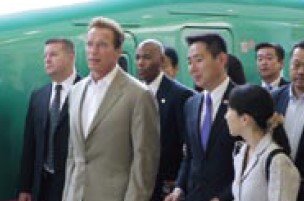
Pursuing Total Service, Providing IT to Customers
The Tokaido Shinkansen Line between Tokyo and Osaka inaugurated its operations on October 1, 1964. Nearly half a century has passed since that historic day, and over those years there has not been a single accident in which a passenger riding in the train has suffered loss of life. Shinkansen lines typically operate with 16-car trains (about 1,600-passenger capacity). The evaluations of this safety record run extremely high. It is not just technology, however, that supports these outstanding results.
One area earning the solid respect of users, meanwhile, is the ability to fully clean the inside of Shinkansen cars in a mere “seven minutes.” Underpinning this outstanding speed and performance are the skills of a team known as the “Shinkansen Cleaning Angels,” in tandem with a corporate vision and thinking on passenger service that effectively supports the team’s exploits. The name of the company behind it all is TESSEI.
“Cleaning Angels” are a powerful team in charge of cleaning Shinkansen trains during the brief interim after arrival and before departing on return trips. Working at super high speeds, these Angels clean the car interiors and tidy up the platform areas. Their efforts enable the next group of passengers to board the trains in full comfort and convenience.
The services provided by TESSEI, meanwhile, are not limited to cleaning alone. The goal is to provide “total service to passengers,” covering almost everything other than technical areas and train operation. If passengers need help, the Angels come to their aid. If there are requests, they lend a hand. The Angels pursue their work with the determination to do everything possible to keep passengers feeling content and at home. These cleaning service personnel even bow to the Shinkansen trains as they pull into the station. Such scenes are unheard of at train stations overseas. Why do they bow to machines?
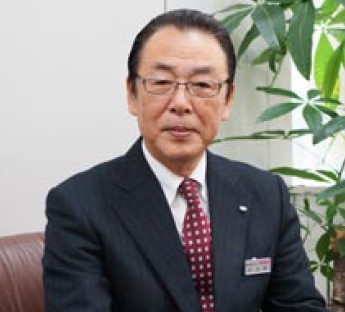
Teruo Yabe, TESSEI’s Senior Managing Director, offers the following simple explanation: “They are not bowing to the Shinkansen, but seem to be doing. It’s because they protect themselves from the danger of bringing high winds when the Shinkansen is arriving to platforms.” Sachiko Murkami, Chief at Omotenashi Creation Dept., told, taking pride in Tessei company, “It is true physically. But we enjoy working at ‘this theatre’ where many people meet, and say to the audience of passenger ‘thank you for riding the Shinkansen’ in our mind, bowing to the machines.”
Did the cleaning personnel and the company start like this and enjoy working here as they do now? Yabe’s answer to this question is simple: “No, they just cleaned in the machines, did not enjoy it. Because at that time, the cleaning job was not respectful from others.”
New Corporate Visions Change Employees’ Mind
Here, we introduce the story of the professional cleaning service team that transformed this sense of uneasiness into conventional wisdom. This is a saga capable of inspiring us to reconsider what work really is, what it means to make a living, and what the true role of management should be.
TESSEI subscribes to the management creed of “Refreshing & Delighting,” “Reliable & Safe,” and “Friendly & Helpful.” What are the origins of the thinking behind these fine services and corporate vision?”
Normally, a 22-person team cleans each 16-car train. When a train scheduled for an immediate return trip arrives at Tokyo Station, the Angels line up in a single row and wait for the passengers to exit. They make a point of greeting the disembarking passengers with calls equivalent to “Have a nice day.” They also voice their “Thank you” to exiting passengers from whom they accept trash in front of the train doors. Once all passengers have detrained, the Angel “magic” begins to shine.
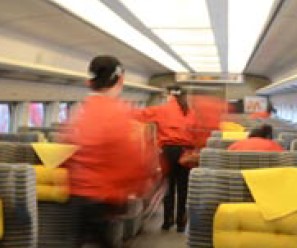
The time available until the train departs on its next run is 12 minutes. It usually takes about two minutes for all passengers to get off, and another three minutes for the next group of passengers to board. That leaves only seven minutes for the actual cleaning. The details of this work are as follows: collect trash, return the seats to face in the correct direction, wipe off seat tables (about 100 per car), clean dirty windows, sweep the floors with brooms, change seat covers, check for any items left behind, clean the restrooms and remove any trash discarded there, raise the window blinds, and wipe the window frames clean.
People actually witnessing this work are overwhelmed by the sheer speed and dexterity. Just like the Shinkansen’s official train class designation, these Angel teams are also “superexpress” in their work routine. When they are finished and get off, they greet the passengers on the platform waiting to board with calls of “Sorry to have kept you waiting!” They are meticulous, in other words, in their courtesy and greetings to passengers.
Overseeing these work conditions are supervisors who serve as on-site leaders, along with veteran employees. When work lags behind schedule or new staffers are unfamiliar with the process, supervisors jump right in to help, perform the final checks and furnish other support.
“Angels and Comets” Appear at Tokyo Station
The true strength of TESSEI lies in its on-site expertise. The diligence of the Angels is not limited to their daily work. According to Yabe, they also come up with a steady stream of insights, ideas, and ingenuity in striving to improve the operations and enhance the quality of service. They don’t simply follow orders. Rather, they mobilize their own independent judgments and spontaneous initiative within the sphere of assigned tasks.
Yabe and Sachiko Murakami told us the following case. An elderly woman appearing to be in her 70s was dragging a heavy bag along the platform. One of the workers on platforms quickly asked the woman what car she was going to board, and was told the car number. Being some ways down the platform, the worker offered to carry the woman’s bag to the car. The lady replied: “Is it really all right to ask you to do such a thing?” She reassured her that it certainly was.
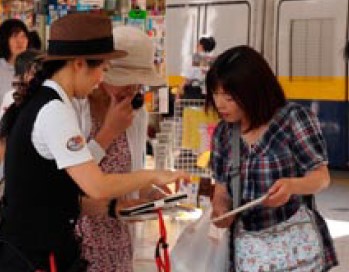
After having the bag carried to her car, the woman sincerely thanked her who had helped out, bowing repeatedly in front of the window at her seat with a big smile on her face.
At the outset, however, few if any TESSEI employees embraced such pride in their work. Around 2005, TESSEI was the caliber of a cleaning company that simply carried out the tasks it was assigned to do. The awareness of the individual employees was largely limited to an image of themselves as just “members of cleanup crews in charge of tidying up Shinkansen cars in stations.” Bringing a change to this situation was Yabe. Back in those days, Yabe worked for East Japan Railway Company as an expert in railway safety systems. Then he was transferred to TESSEI, a company that had failed to receive any high marks to speak of for its work. Yabe wondered why he had been sent to such a firm, not to mention the fact that he was a complete novice when it came to cleaning, service, and other such operations. Yabe, however, switched over to a new mindset.
Bring up the Company to No.1 with Pride
“As long as I’ve been assigned here,” he thought, “I’d like to make this into a good company.” With such thoughts in mind, he assumed his new position. He soon realized that the staffers were serious about their work and getting the job done right. However, Yabe also says there was considerable distance between the on-site workers and the management, with a sense that the specific mission of the company, and what it was striving to accomplish on a daily basis, was not being communicated down to the rank and file. In short, there was no sense of solidarity between the management and employees. Taking this to heart, Yabe kicked off discussions on the question of what type of company TESSEI should actually be, based on the idea of instilling the capability to supply a total service package. Toward that end, he began to formulate a work model designed to be readily visible to everyone in the company.
Four months after beginning his new job, Yabe organized a team, named the “Comet Supervisors,” to undertake information services in support of passenger needs and the cleaning of the platform concourse. To add an extra bit of punch, new uniforms were also adopted for this team. Naturally, Yabe recalls, there were some employees who grumbled about why a cleaning company needed to extend its services to such areas. But he stuck with his gut feeling, pushing ahead with the conviction that there were employees who would identify with his stance and the underlying philosophy. Indeed, there were staffers who agreed with his vision and provided the driving force in a vigorous push to deploy information services, while also coming out with their own ideas.
Riding this momentum, it was also Yabe who advanced improvements in the worksite arrangements. Up to that point, the car cleaning teams took their breaks and held discussions in a staff room under the platform. This room had limited air-conditioning system, affording the workers little quality downtime following the hard work of cleaning and preparing the train cars. The conditions were particularly exhausting during the hot summer and chilly winter months. Realizing that without a more worker-friendly environment it was unlikely that the frontline teams would ever grow more upbeat about their jobs, Yabe arranged for the installation of air conditioning in that room.
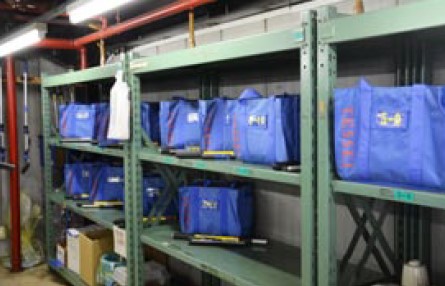
Next, Yabe set out to restructure the corporate organization. With his sights firmly fixed on realizing a total service company, he recognized that a free and open in-house atmosphere was essential. This meant adopting a more simple organizational structure, and having the company move forward together toward a single goal. To take that step, the promotion system was simplified, with part-timers who were age 20 and over and had been with the company for at least one year able to take the regular employee test of their own volition (without the need for a recommendation from an on-site supervisor). Besides this, in the interest of instilling a greater sense of unity among all employees, an event named the “Customer Service Joint Rally” was organized. This was organized as a forum for announcing and explaining concrete approaches aimed at more effective implementation of total service. As it were, it resembled a quality control meet based on group competition and targeting all employees. Other initiatives have included holding a “Train Car Cleaning Competition” to enable employees to show off their car cleaning skills and other ideas.
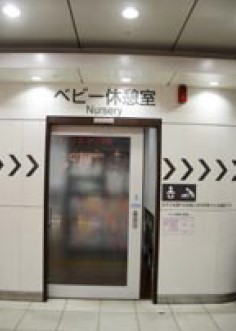
This set the stage for the transition to being a genuine total service company. The goal was envisioned as changing into a firm capable of supplying passengers with “delightful space,” “reliable support,” and “friendly service.” Emerging, that is, from the dimension of a mere cleaning company to attain the status of a genuine “hospitality company” supporting optimum journeys for each passenger. Vigorous efforts were likewise made to introduce small-group activities and employee suggestion systems. The conventional workplace thinking, of simply following orders and carrying out duties, evolved into energetic moves by employees to offer their own ideas. According to Yabe, the number of in-house suggestions, which had totaled some 160 proposals up to that point, skyrocketed to close to 1,000. Emerging from this new backdrop was Smile TESSEI – an in-house training booklet featuring easy explanations of the preferred attitudes and awareness in performing on-site work.
The volume of these small ideas and suggestions steadily grew, leading to improvements in work approaches and schemes, along with clear advances in the quality of customer service. A classic example of the progress powered by these ideas was the introduction of a lounge for mothers and infants inside the Tokyo Station Shinkansen concourse. This new amenity stemmed from the efforts of a certain Cleaning Angel, who noticed the large number of passengers inconvenienced by the absence of a location to breastfeed, change diapers, or other care for babies. The Angel reacted by directing a suggestion to the parent company (East Japan Railway) to do something to rectify that situation.
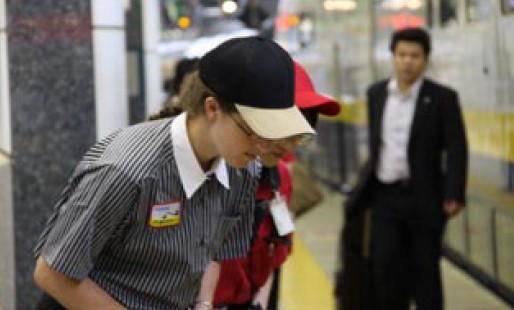
Strong Improvement Activities Support Passengers and the Company
Moreover, TESSEI staffers have also risen to the challenge of their appearance. It started off with the addition of bowties to the work uniform. While Yabe notes that some employees initially felt strange about the idea of wearing bowties while servicing train cars, the change was made for the male Angels. While this began as an experiment to better express the face of a hospitality company, it also succeeded in demonstrating how a bit of ingenuity and thoughtfulness can be pleasing for passengers as well. That triumph triggered a steady stream of constructive ideas and suggestions. Changes such as this have helped the Angels more fully appreciate themselves as employees working for a devoted hospitality company, while at the same time leaving a positive and pleasing impression on passengers. Other efforts along those lines have included appearing in Santa Claus outfits during Christmas season, decorating their hats with cherry blossoms in early spring, wearing yukata (a light cotton kimono) in summer, and other playfully imaginative touches well received by passengers.
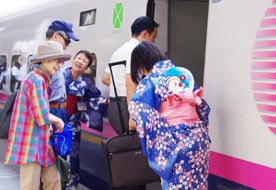
Measures were also devised and carried out to support regions damaged by the Great East Japan Earthquake on March 11, 2011. This included attaching relief support emblems to the Angel uniforms, handing out recovery assistance postcards to passengers on station platforms, and other action. Furthermore, to express support for earthquake relief efforts, messages reading “Keep Fighting Japan” were added to the “At Work” signs hung from the doors while cleaning the cars. This was yet another endeavor that caught the eyes and attention of many passengers.
Management Philosophy Attracts Students and Foreign People
There is one further area, outside of passengers, which TESSEI targets as a major priority. This concerns the company’s contribution to society by providing workplace-training sessions for young people. In this program, junior and senior high school students are able to actually take part in car cleaning work, giving them the opportunity to experience and think about what work really is and what it means to make a living. There are schools that participate in this training on regular basis every year. TESSEI also receives requests from overseas to take part in this program. Examples include prestigious institutions of education such as Stanford University in the US and ESSEC Business School in France, from which students have changed into Angel uniforms to undergo the on-site training.
TESSEI celebrated the 68th anniversary of its founding in October 2020. The saga of the Cleaning Angels, a team of professionals that TESSEI and Japan can truly take pride in worldwide, has now spawned a musical, aptly titled “The Shinkansen Cleaning Angels.” This production is set to run from March 16 to 24 this year. In these and other ways, the pride that TESSEI employees take in their work and their company, and the respect that they enjoy in the eyes of the passengers that they serve, is continuing to flourish and expand.


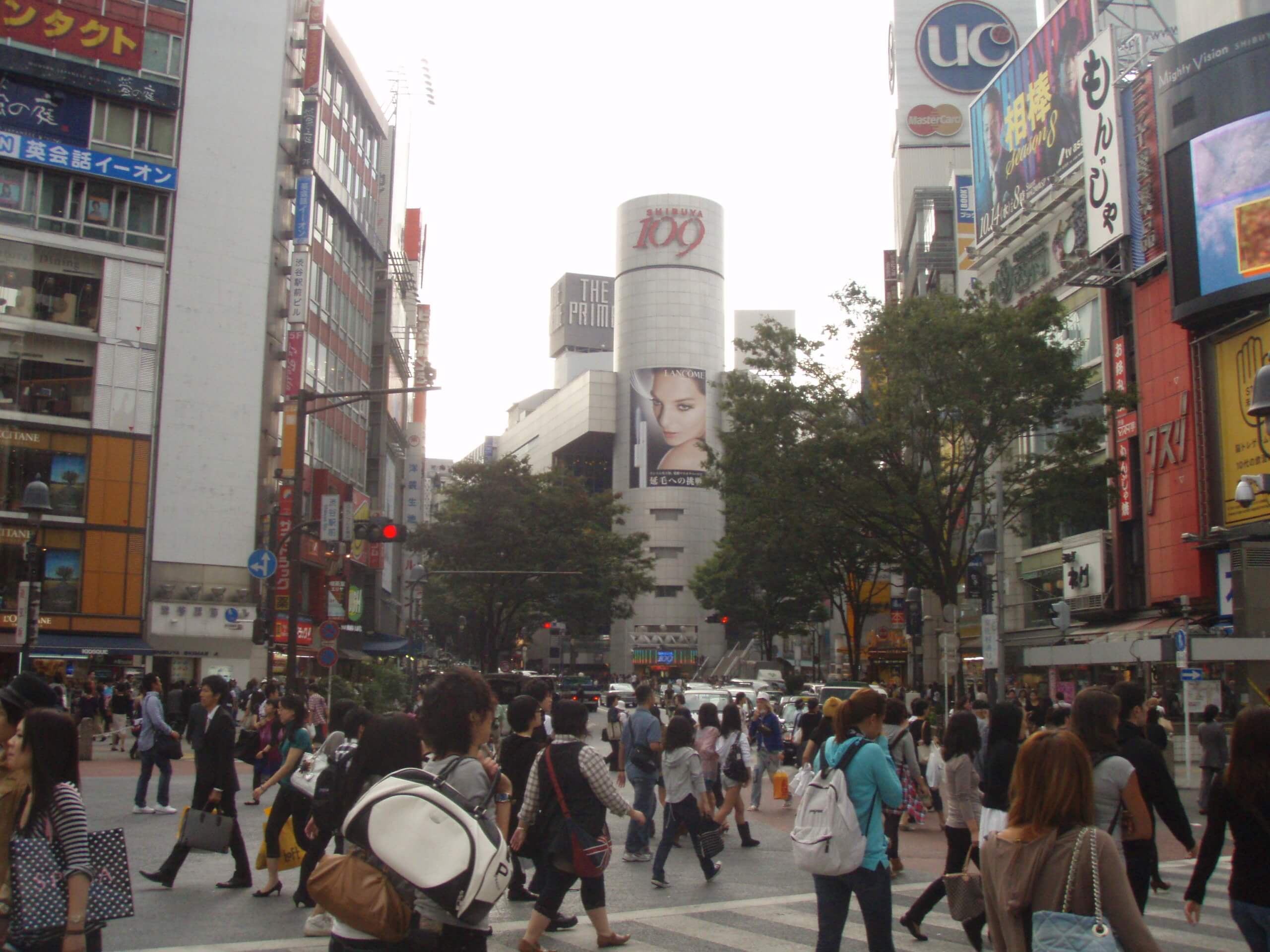
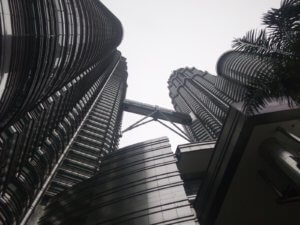
One thought on “Tessei, The Shinkansen Omotenashi: The Seven-minute Short Play with Winning Applause”